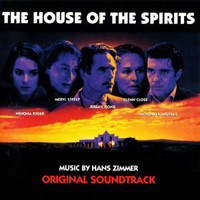- Composed by Hans Zimmer
- Virgin Movie Music / 1993 / 44m
An epic telling the story of several generations of a Chilean family through the second half of the 20th century, against the backdrop of the revolution, The House of the Spirits attracted good reviews but not much of an audience upon its release in 1993. There’s a very strong cast – Jeremy Irons, Meryl Streep, Glenn Close, Winona Ryder, Antonio Banderas, Vanessa Redgrave. It was Danish director Bille August’s first Hollywood movie after a string of successful projects in his homeland and in Sweden.
Hans Zimmer was in the transitional period of his career at the time when he had several successful movies under his belt but probably wasn’t quite considered to be amongst the film music A-list. This was the sixth and final score of a busy and varied year for the composer, the others being The Assassin, Younger and Younger, Calendar Girl, True Romance and Cool Runnings – an eclectic bunch, for sure. While his Media Ventures studio had been established for a few years already, it was far from the behemoth that it was to become, and Zimmer was still at the time primarily a film composer rather than the very successful businessman and perhaps “producer of soundtracks” that he was to become.
If anyone needs any evidence that the earlier period of his career featured genuine creativity and no shortness of quality, The House of the Spirits is a good point of reference. In keeping with quite a few of his soundtrack albums at the time, the music is arranged into five lengthy suites. The opening suite is elegant, primarily orchestral, gorgeously romantic music with a classical sound to it that is very far removed from the sound with which many people would primarily associate this composer. The main theme is very beautiful – it’s not ravishing and romantic, in fact it seems to keep a fair bit in reserve, but that leads to a real emotional intelligence which is explored further in the more obviously romantic “Clara”, which features a classical piano melody which is perhaps purloined from somewhere else, but is simply heartmelting.
In “Coup” the composer explores a desperate feeling of hopelessness, of strained anguish and suffering – interestingly he does it through admittedly occasionally heavily-wrought, but still primarily what is assuredly traditional orchestral film music, displaying a sure touch and even at times a certain deftness that comes as a surprise. The cue’s dramatic section which builds up through its middle part, with the very dramatic brassy anthem, isn’t what you might call deft, but even there it does come from real musical development and no shortage of extended thinking. The climax is the first overtly tense part of the album, with some slightly dissonant textures emerging.
“Pedro and Blanca” feels like the musical story of a love affair – from the tentative early steps through a stage of perhaps unsatisfied yearning, building to a final tragedy. The guitar solos are gorgeous, various other ethnic tinges add some real flavour. It’s really beautiful, intelligent music. The finale cue is slightly hampered by the inclusion of a source song (which just seems to disrupt the flow of music which has been so carefully thought through otherwise in the assembly of the cues) – but either side of it there’s some stunning music, including a wonderful rendition of the main theme to close the album.
The inescapably sense of tragedy running through a lot of this score means it isn’t one you might stick on if you need cheering up, but if you are in the right mood then it is richly rewarding. The music is colourful, the ideas are well-developed, the emotion very carefully controlled so that the highs always feel earned. I think The House of the Spirits is one of Zimmer’s finest scores, one which seems to often be neglected when people go through the composer’s finer works; and I highly recommend it as a showcase of a side to his music which hasn’t often been heard.
Rating: ****
facebook.com/moviewave | twitter.com/MovieWaveDotNet | amazon.com













A really neglected score indeed. There was a moment when Hans was, with all his affinity for technology, one of the strongest proponents of a neo-classical sound (if a tad romantic in the 19th Century sense). In fact, I would also go as far as to say that in his early efforts, this score features some of his best, if not very best, orchestrations.
Hm, do I sense a pattern of revisiting older Zimmer scores to put the lie to the suggestion that you have it in for poor Hans? Either way, great review.